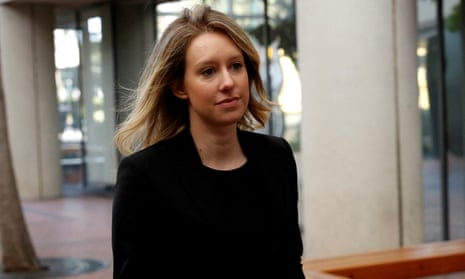Theranos founder Elizabeth Holmes must begin serving her prison sentence while she appeals against her conviction on charges of defrauding investors in her failed blood-testing startup and must jointly pay $452m in restitution to the victims of her crimes, a court in San Francisco has ruled.
Holmes, who rose to fame after claiming Theranos’ small machines could run an array of diagnostic tests with just a few drops of blood, was convicted at trial in San Jose, California, in 2022 and sentenced to 11 years and three months in prison.
She had asked the ninth US circuit court of appeals to pause her sentence on 25 April, two days before she was to report to prison. The court on Tuesday denied her bail application.
The judge will set a new date for Holmes, 39, to leave her current home in the San Diego area and report to prison.
In a separate ruling Judge Edward Davila held Holmes jointly liable for the restitution payments and ordered her to pay the $452m with her former lover and top Theranos lieutenant, Ramesh “Sunny” Balwani.
Balwani, 57, began a nearly 13-year prison sentence in April after being convicted on 12 counts of fraud and conspiracy last July. He was put in a Southern California prison last month after losing a similar effort to remain free on bail while appealing against his conviction.
Holmes said she believed Theranos could revolutionise healthcare with a technology that she promised would be able to scan for hundreds of diseases and other potential problems with just a few drops of blood.
While pursuing this ambition, Holmes raised nearly $1bn from a list of investors that included Oracle co-founder Larry Ellison and media mogul Rupert Murdoch. Those sophisticated investors all lost their money after a Wall Street Journal investigation and regulatory reviews exposed dangerous flaws in Theranos’ technology.
In his restitution ruling, Davila determined that Holmes and Balwani should pay Murdoch $125m – by far the most among the investors listed in his order. The restitution also requires the co-conspirators in the Theranos scam to pay $40m to Walgreens, which became an investor in the startup after agreeing to provide some of the flawed blood tests in its pharmacies in 2013. Another $14.5m is owed to Safeway, which had also agreed to be a Theranos business partner before backing out.
Prosecutors had been pushing for a restitution penalty in the $800m range, but in separate hearings, lawyers for Holmes and Balwani tried to persuade Davila their respective clients should be required to pay little, if anything.
Both Holmes – whose stake in Theranos was once valued at $4.5bn – and Balwani – whose holdings were once valued around $500m – have indicated they are nearly broke after running up millions of dollar in legal bills while proclaiming their innocence.
Holmes’s lawyers have been fighting her conviction on grounds of alleged mistakes and misconduct that occurred during her trial.
They have also contended errors and abuses that biased the jury were so egregious that she should be allowed to stay out of prison while the appeal unfolds – a request that has now been rebuffed by both Davila and the ninth circuit court of appeals.
Reuters and Associated Press contributed to this report
